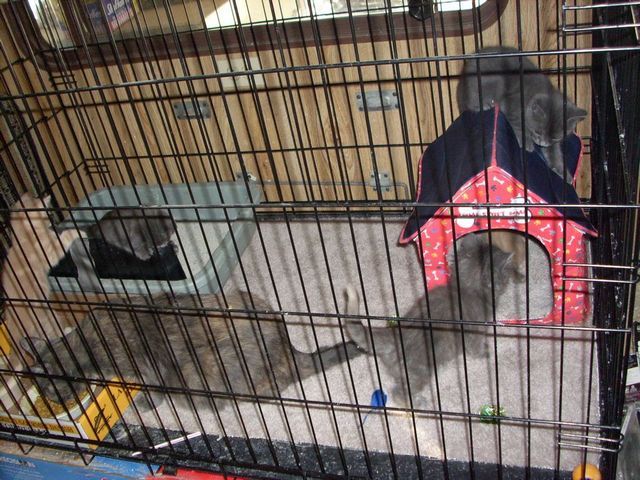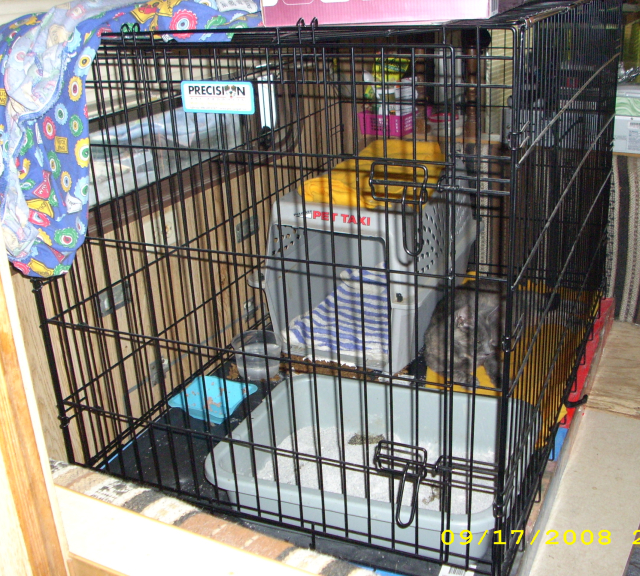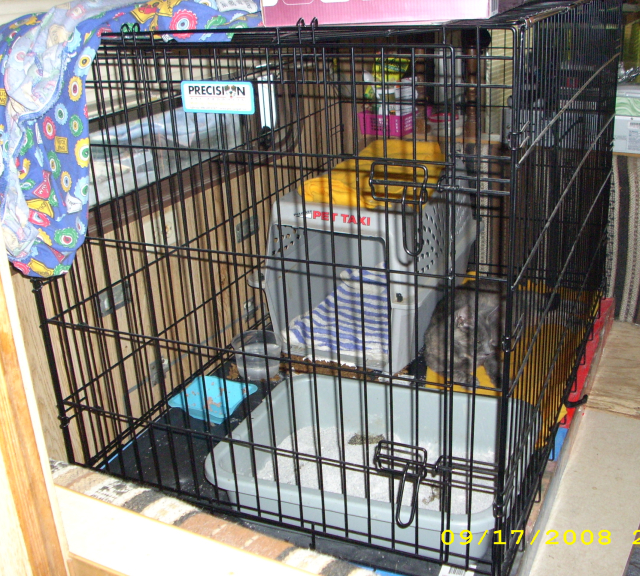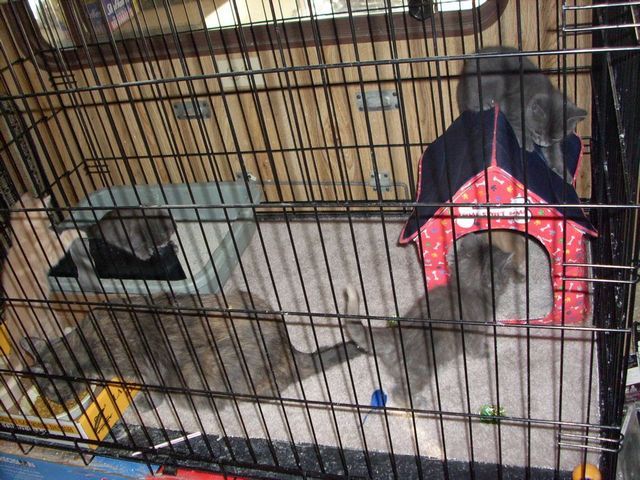QuestionQUESTION: I have just trapped a kitty from my barn, Im guessing she is about 4 months old. She lets you pet her WHOLE body, doesnt allow you to lift her though and will eat from your hand. I have her brothers from last yrs litter here and they are amazingly needy, they are more affectionate and confident than my people kitty. But with this new little girl, she walks very low to the ground, croutched over and she constantly looks at me to see if Im looking at her but then she comes within a foot of me n as long as I dont look at her she will stay but if I do she runs. I have her in with my people kitty in my bedroom, which I still sleep in. I do not understand why she is still crouching, her brothers were not after the first 4 hrs. Is there any more I can do?
ANSWER: Jennifer,
That is typical feral behavior. Her brothers may have had a different father, one that was domesticated, in which case, the cat's behavior will be different. A cat can have kittens by each tomcat that bred her during her heat cycle.
Looking a feral in the eye is a threatening gesture! Try to avoid eye contact unless you slowly blink when looking at them. That means you are friend, not foe.
It takes a lot of patience and special handling with ferals. I have found that they prefer a neck 'massage' (massage just in front/above the shoulder blades# to being actually petted. I have 2 that will be 2 years old that I have had since birth. They are still skittish, and both will let me pet them for an extended time only when they have a toy in their mouth! Neither like to be held or carried, but both sleep with me. One will hide under the bed for HOURS if she hears a strange noise or sees someone. She crouches/slinks too. Ferals can be domesticated up to a point, depending on the history or the parents #whether one or both were feral#, but they will still retain their basic personality traits.
True ferals CAN become affectionate and loving, but it can take a LONG time for them to reach that point. And it takes a lot of time, patience, and love. And when they do reach that point when they are affectionate and loving, they normally still do not like to be held, restrained, and barely even petted. There is a human distrust that is inherited and inbred into them. They will never be like a typical domesticated housecat, but they can follow you around, rub against your legs, and lay next to you happily. Getting ferals as newborns or young kittens you have a better chance for a friendly kitty, but even then they still carry the feral behavior with them. Of course there are exceptions, but that is the standard behavior for ferals. They also usually only bond with one person. And will remain skittish and frightened of strangers.
To protect yourself from bites or scratches you need to watch ferals closely. They will give you warnings when they have had enough petting or touching. Ears will pin back, they may growl, but the main sign is their tail. If it starts twitching or swishing back and forth, the time to stop petting them is....NOW! When you have a feral that doesn't like to be touched....don't. Respect how the cat is and accept it. It will make for a happier living situation. Biting is a reflex action for protection. Pet from behind the head. Coming from the front is a recipe for claws coming out or being bit.
They are very sensitive, so do not yell at them and never hit them! You can undo any trust you have built up. They react to the tone of your voice.
They are natural hunters and enjoy being able to do it. They are happiest being able to be an indoor/outdoor cats. They like to be outside to hunt, but they also like to be inside where it is safe and not scary. You also will run across the ones that never want to go outside again.
If you keep them inside all the time then you need to satisfy the hunting urge to keep them mentally well-balanced and happy. Giving them a raw beef rib bone #I have the butcher cut them in half# satisfies the "fresh kill'. Plus the fibers help clean their teeth. They need stuffed toy mice you can throw so they can chase it and "catch" it. A pet laser light is great for letting them try to catch the "little red bug" on the walls, floors, and ceilings.
Here is a link that has a good 4-part article on ferals that should be of help to you in understanding their behavior.
(copy and paste, or type, the whole link into your address bar)
http://petplacestation.com/articles/?s=jacobi%26paged=2
Patience and time, accepting them and their behavior for what they are, and not trying to force them to be a social domesticated housecat are the basic keys to success with ferals.
Tabbi
---------- FOLLOW-UP ----------
QUESTION: She isn't mean at all, she is just very nervous. I can pet her, I always make sure she has an escape route incase it becomes too much for her. I will only pet her for a few quick strokes then I let her be. She is using the kitty litter fine, eatting and drinking. She isn't crouching anymore but she constantly looks to see where I am and what I'm doing from a distance. I am frowing very sad for her, she stares out the window and meows all night. I have a bunch of toys on te floor for her and my other kitten but she has no interest. It has only been 6 days, do you think her chances of warming up are good or would it be best to fix her and release her. I have large tin foil pans out in my barn with kitty food to feed the ferals we have.
AnswerJennifer,
It sounds like she has separation anxiety and is mildly depressed. She probably misses the cats in the barn and what was familiar to her. That is a normal reaction. She's watching you because she's not sure whether to trust you or not. It will just take time. It sounds like she is just timid and not used to people, and not mean. Possibly her dad was domesticated (tame) at one time and maybe abandoned or dumped, then turned wild.
I definitely would get her spayed soon then go from there. A cat is adaptable to most circumstances given time, though once a cat has been an outside cat, some do not adjust very well to being 'locked up', especially a natural born hunter. Maybe (only after she is spayed!) you can leave your door cracked open and give her the option of going back outside. She may hightail to the barn, but she may also surprise you and come back inside after awhile.
Food is a great bribe! Give her treats like canned tuna, tinned sardines in oil, raw meat, etc. That is so she will associate you with something pleasant and not negative.
It may take a couple of weeks or more for her to acclimate to her new surroundings and not be so stressed and nervous. She will probably always remain timid (especially around others), but she will learn to trust you and should become more affectionate. You are doing the correct things, especially just petting her briefly at this point. Let her progress as she feels comfortable.
Judge her behavior and actions. If it looks like she is not adapting to being socialized, then maybe it would be better not try to turn her into a housecat. Or, if she reaches the point that she enjoys being petted, and she will come to you in the barn, then let her be an indoor-outdoor cat. Let her out during the day, but bring her in at night where she is safe from the 'creatures of the night'. Then she will have the 'best of both worlds'!
She is lucky to have a person like you that cares. Keep me posted on how she is doing.
Tabbi

 One of my two cats is attacking the other
QuestionQUESTION: Last April after losing my dog to ill
One of my two cats is attacking the other
QuestionQUESTION: Last April after losing my dog to ill
 Wonderful, Frustating Cat
QuestionI have a cat that adopted me, my dogs and my ot
Wonderful, Frustating Cat
QuestionI have a cat that adopted me, my dogs and my ot
 Assimilating a disabled cat into our home
QuestionDear Tabbi,
My husband and I share our home wit
Assimilating a disabled cat into our home
QuestionDear Tabbi,
My husband and I share our home wit
 Young female cat TORMENTS our older female! :(
QuestionMy Kitties
QUESTION: Hi, I really need s
Young female cat TORMENTS our older female! :(
QuestionMy Kitties
QUESTION: Hi, I really need s
 tabby aggressive
QuestionHi,my male cat jasper is 7 years of age and has
tabby aggressive
QuestionHi,my male cat jasper is 7 years of age and has